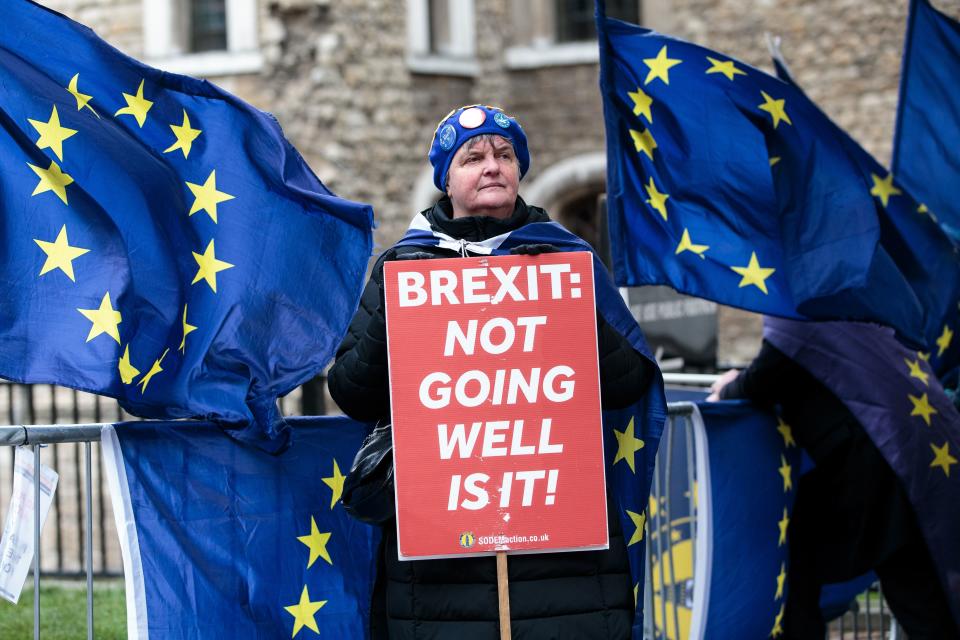Brexit: Britain's Parliament votes to delay EU departure
LONDON – British lawmakers decided Thursday to seek a Brexit delay, a move that follows months of political deadlock over Prime Minister Theresa May's divorce deal that has caused a crisis over Britain’s departure from the European Union.
The House of Commons voted 412 to 202 to ask the EU to push back the UK’s departure from the bloc in less than three weeks to at least June 30.
The vote in Parliament comes on the heels of an attempt by lawmakers to block the country from leaving the EU on March 29 without a formal withdrawal agreement. May's contentious departure deal has been rejected by British parliamentarians twice, but there is even less appetite for a "no deal" exit.
The delay, though it passed in Parliament, needs to be approved by the leaders of the EU's 27 other members, and May indicated that she will make a third attempt – probably next week – to get lawmakers to support her Brexit deal. Even if Brexit is delayed, Britain will depart the EU without a deal if an agreement is not reached during the delay.

It's not clear how long any extension would be or whether conditions would be imposed. Donald Tusk, president of the European Council, the Brussels-based body that sets the bloc's overall political direction and priorities, said in a tweet Thursday he would appeal to EU leaders "to be open to a long extension if the U.K. finds it necessary to rethink its Brexit strategy and build consensus about it."
More: UK Parliament acts to avert 'absolute catastrophe' Brexit
More: 'Bewildering, dire, disastrous': Queen has a Brexit escape plan
Although the bloc could consider a delay to Brexit, it made it clear that after two years negotiating with May, it is not open to more talks on her deal, meaning the prime minister needs to find a way to convince British lawmakers to accept it.
Lawmakers are desperate to avoid a "no deal" withdrawal because EU legislation that Britain adopted over decades covers a range of issues from transportation policy to workers' rights that would effectively evaporate overnight.
Michael Gove, Britain's environment secretary, told Parliament on Wednesday night that tens of thousands of businesses were not prepared for a "no-deal" exit.
May and the EU have signed off on critical issues accompanying the country's EU divorce, such as how much Britain will need to pay to leave the bloc (about $50 billion) and what rights EU nationals living in Britain under the bloc's reciprocal working rights arrangements will have after the separation (similar to what they have now, but they'll need to prove they are not a burden on the state).
The deal has fallen afoul of British lawmakers over the question of the land border between Northern Ireland (part of Britain) and Ireland (part of the EU).
The border is open to facilitate trade and travel, and its status is an important element in ensuring peace between Northern Ireland’s Irish Catholic community and its British Protestant one.
May and the EU devised a plan to keep the border open, but British lawmakers who support Brexit fear the plan would effectively tether Britain to the EU indefinitely.
For Brexit's supporters, leaving the EU represents, among other things, an opportunity to strike unilateral trade deals with other countries, including the United States.
More: Trump vowed to end 'chronic trade deficits.' Trade deficits just hit a record high
This is not something Britain is permitted to do as part of the EU, which negotiates international trade agreements as a bloc. "My Administration looks forward to negotiating a large scale Trade Deal with the United Kingdom. The potential is unlimited!" President Donald Trump tweeted Thursday.
Trump addressed Brexit from the White House, where he met with Ireland's leader, Leo Varadkar. "It wasn’t that I was a supporter. I predicted that it was going to happen. I was right and people laughed when I predicted it," Trump said.
"I'm surprised how badly it’s all gone from the standpoint of the negotiations. ... Both sides are very, very – you know, they are cemented in," Trump said. "It’s a tough situation. It' s a shame. Frankly, it’s a shame. There was no reason for that to happen."
May has defied critics who called for her resignation over her handling of Brexit. She refused to consider holding a new national referendum on Britain's EU membership despite growing calls for one. Britain voted to leave the EU in 2016 by 52 to 48 percent. Polls show the country is still split on the issue.
This article originally appeared on USA TODAY: Brexit: Britain's Parliament votes to delay EU departure

